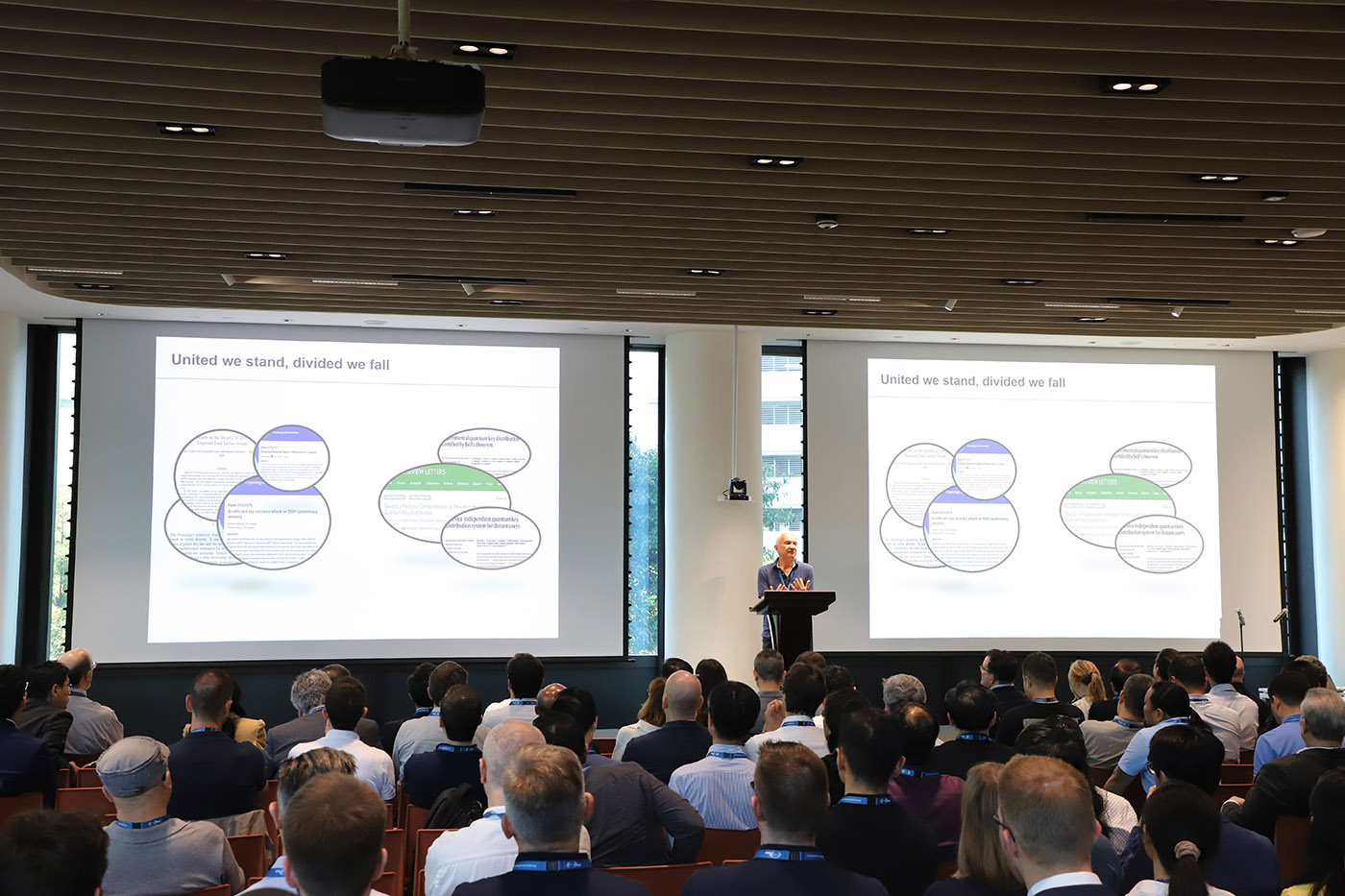Highlights
CQT hosts the 10th ETSI/IQC Quantum Safe Cryptography Conference
 CQT founding Director Artur Ekert gave a keynote speech to a full house. The conference featured two tracks - an executive track for business executives wanting an overview of technologies for a quantum-safe future and a technical track going into details.
CQT founding Director Artur Ekert gave a keynote speech to a full house. The conference featured two tracks - an executive track for business executives wanting an overview of technologies for a quantum-safe future and a technical track going into details.
Some 235 delegates from about 25 countries were in Singapore to discuss quantum-safe cryptography at the prestigious ETSI/IQC Quantum Safe Cryptography Conference held from 14 to 16 May.
CQT is proud to have hosted the tenth edition of the conference organised by ETSI, the European Telecommunications Standards Institute. The Institute for Quantum Computing (IQC) at the University of Waterloo, Canada, Singapore’s Infocomm Media Development Authority (IMDA) and Cyber Security Agency (CSA) were conference partners.
IMDA Chief Executive Chuen Hong Lew gave opening remarks at the event, posting afterwards on LinkedIn: “Quantum computing is probably closer than we think. It has immense potential to make breakthroughs in drug discoveries, material science and beyond by solving problems that today’s computers can’t. It also raises the need to secure communications and data in areas that matter. This makes the 10th ETSI - IQC Quantum-Safe Cryptography Conference particularly exciting and relevant.”
For executives and experts
The conference had two different tracks. The executive track on the first day was designed for business executives, outlining the state of the quantum threat and quantum risk management. CQT founding Director Artur Ekert and Michele Mosca, the Programme Committee Chair, gave keynote speeches. Talks and panel discussions throughout the day addressed topics including government actions and approaches, quantum-safety for the finance industry and transitioning to a quantum secure cryptographic infrastructure.
The technical track over the next two days of the conference went into details of how new cryptographic technologies are being developed to ensure security in a post-quantum era. Featuring over 40 talks, participants looked at efforts and initiatives from around the world, from the deployment of quantum key distribution networks to certification and migration challenges.
Some presentations given during the conference are available on the conference website: www.etsi.org/events/2284-10th-etsi-iqc-quantum-safe-cryptography-event.
Speakers in the technical track included CQT’s Haw Jing Yan on experiences building Singapore’s National Quantum-Safe Network (NQSN) and Hao Qin on standardisation efforts for quantum key distribution (QKD).
The NQSN team also supported the organisation of satellite events held on 17 May, the day after the ETSI conference ended. These were for the International Telecommunication Union (ITU): a workshop “Insights on QKD & QKDN certification: Recent developments and challenges” and a meeting of the “Joint Coordination Activity on Quantum Key Distribution Network”. A meeting of the GSMA Post Quantum Telco Network Task Force also took place in parallel. The GSMA is a global association representing the mobile ecosystem, including mobile network operators.
CQT Principal Investigator Alexander Ling, who leads the NQSN and was the Singapore organiser for the conference, says: “The scale and complexity of overhauling the cryptography used in our communication systems is unprecedented, even when compared to high profile concerns such as the Y2K event 25 years ago. It is necessary that the world's cryptography experts meet regularly to discuss the challenges and strategies for performing the migration to quantum-safe communications, while minimising disruption. The 10th ETSI/IQC Quantum Safe Cryptography Conference brought the world's leading experts to our region, and we will continue to take part in these important conversations on coordination and best practices.”
Learn more
Related Stories
Third Quantum Computing Workshop takes theme of AI optimisation and forecasting April 23 2024 | |
Quantum Energy Initiative holds first international workshop in Singapore November 29 2023 |






